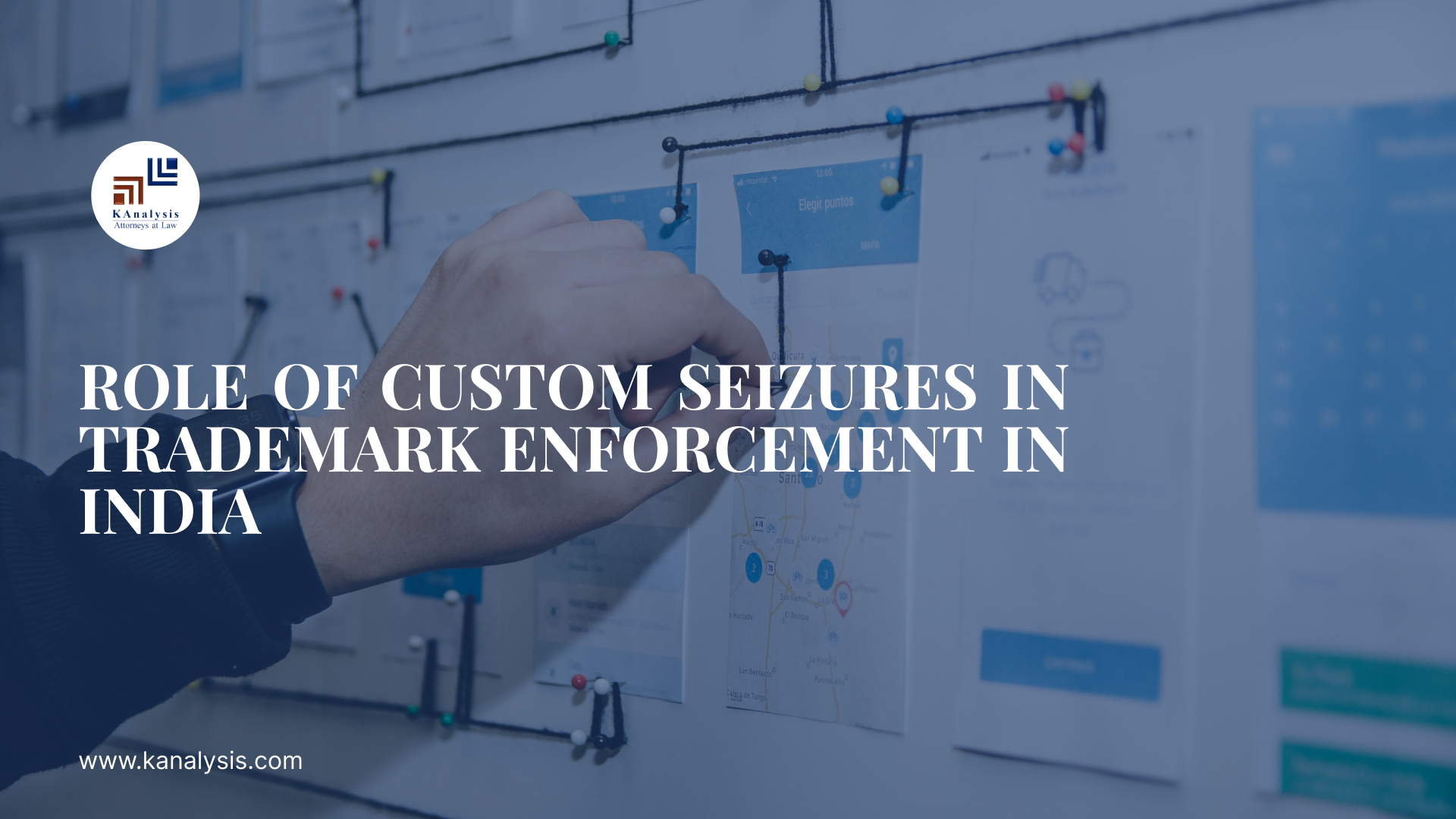INTRODUCTION
In the last few years, counterfeiting is the fastest-growing crime as one in three adults in India has fallen prey to fake products bought through online or offline mediums.[1] The protection accorded to the trademark rights help in creating a brand identity which the consumers can trust on. Customs Authorities play an active and crucial role in preventing counterfeiting. Customs Authorities are active at the border to ensure that illegal or counterfeit products are not imported to India and are seized there so that they do not penetrate the Indian market. Cooperation between customs and IP right-holders helps identify goods suspected of infringement and consequently protects intellectual property rights.
LAWS GOVERNING CUSTOM SEIZURES
The Indian Customs Act, 1962 prohibits the imports of goods that infringe intellectual property. Sections 11,111 and 113 of the Customs Act, 1962 give powers to the Customs Authorities to take the action against infringing goods at the border at the time of import and export. While, IPR laws have provisions for civil and criminal remedies for the right holder in cases of infringement, the Customs authority is empowered with limited power to take action against the infringing goods imported and exported.
These powers are subject to the procedures laid down in IPR (Imported Goods) Enforcement Rules, 2007 (hereafter IPR Rules) issued under Customs Act, 1962. Under IPR rules, Rule 7 (9) provides for the seizure of infringing goods. If there are sufficient reasons present, the Customs officer is liable to confiscate such goods in accordance with S.111 of the Customs Act, 1962.
PROCESS OF CUSTOM SEIZURES
The IPR rules provide for the process that authorizes customs officials to seize goods infringing the trademarks of the rights holder at the border without obtaining any orders from the court. These rules elaborate on the procedure that is to be adopted by the owners of intellectual property (called Rights Holder) to get their notice registered with the Customs authorities. This is called Custom recordal. There is an e-application for effective implementation of the IPR border measures that is ARTS- (Automated Recordation and Targeting System for IPR Protection in India). In this application, the rights holder registers his rights both at local and national level across all the major customs locations in India. As of now this procedure is hosted on http://ipr.icegate.gov.in. The following is the procedure of such recordal in brief:
- Filing of Notice by the Right Holder:
- The right holder can log on to the ICEGATE (Indian Customs Electronic Commerce/Electronic Data Interchange Gateway), portal and choose the location of the custom house where they want to record the notice of suspension. For each different IPR’s like copyright, trademark etc. a separate notice is to be filed and submitted.
- On submission of application, a Unique Temporary Registration Number (UTRN) is generated and communicated to the right holder. UTRN is just an acknowledgement of the application and does not accord any protection to the right holder.
- The Right holder has an option of either executing:[2]
- General Bond without security and consignment specific bond with security at the time of interception of infringing consignment or ;
- Centralized bond with Security, to the Jurisdictional Commissioner of Customs in the prescribed format and;
- Prior to grant of registration, the right holder is also required to furnish an Indemnity bond to the Commissioner of Customs at the port of registration in the specified format.
- The following documents, inter alia, are needed in order to effect the IP recordation:
- The registration certificate of the IPR in India;
- The Import Export Code of the establishment;
- Statement of Grounds for suspension of suspected infringing goods;
- In case the organization holds IP Rights from another foreign company: (a) The Deed of Transfer of IP rights/ Deed of Authorization to Import; (b) Trademark License Agreement/ TM User Agreement;
- In case the organization holds exclusive rights to import, a statement of grounds of exclusivity to Import;
- Multiple digital Images of genuine products as well as counterfeit or infringing goods;
- List of countries where the organization’s genuine goods are manufactured;
- Power of Attorney if acting through an Investigation firm;
- General Bond/ Centralized bond and Indemnity Bond in the prescribed formats.
Once the recordal process is complete, any goods infringing the Intellectual Property Rights entering India through any port, airport, land Customs station etc. shall be deemed to be prohibited and is subject to examination, seizure and destruction.
B. Procedure to be followed after Interception of Infringing goods
Once the IP is registered with customs, the Customs authority keeps a watch on such suspect consignment.
- Suspending the clearance of prohibited goods – After the grant of the registration, the importation of goods that infringe the rights holder trademarks are deemed to be prohibited, as has been defined under The Customs Act, 1962.
The Customs officers have the authority to suspend the clearance of such prohibited goods either at the information received by the rights holder or by initiating suo-moto action, provided they have prima facie evidence or reasonable grounds to believe that the imported goods are goods infringing the trademarks of the rights holder.
- Informing the Right Holder- After the clearance of the suspected goods is suspended, the Customs authorities have to inform the rights holder of the same. Following the inspection, suspected goods which are found to be counterfeits or otherwise infringing on IP rights are confiscated by Customs, the importer having the right to appeal the decision. If the rights holder did not execute the requisite bond and joins the proceedings against the importer within the prescribed period the Customs authorities will release the suspended goods.
CONCLUSION
Custom Authorities are gaining importance for their role in enforcing intellectual property by protecting borders from the entry of goods that infringe on intellectual property. In the wake of increasing international trade, Customs has broader responsibility for border control and IP protections, since there cannot be any better solution for intellectual property protection than confiscating infringing goods at the border itself. The role of an enforcement agency is extremely vital and critical. However, in India, barring various steps have recently been taken to strengthen the implementation of intellectual property enforcement. Strong IPR implementation contributes to every country’s economy, weak regulation does the opposite impact.
[1] According to the report “The State of Counterfeiting in India in 2021” by the Authentication Solution Providers’ Association (ASPA) 1623216858-4730baa0efdb83aba174859af0a3a6a5-Report The State of Counterfeiting in India 2021.pdf (aspaglobal.com)
[2] https://www.kolkatacustoms.gov.in/admin/uploads/pdf/KC_Port_Orders_8_SO-07-11.pdf

